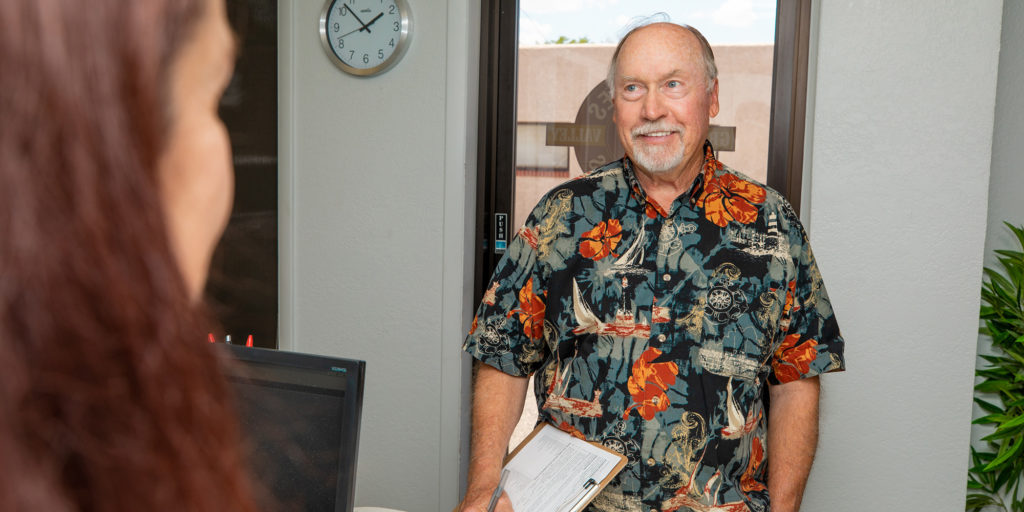
Answers To Common Tooth Replacement Questions
At Ohana Dental Implant Centers, we go above and beyond to ensure patients are well informed about different tooth replacement options. In addition to answering questions at your first consultation, we developed this dental implant FAQ in Montrose and Grand Junction, CO to help you prepare for your first visit. We love when patients come armed with more questions because we’re equal partners on your journey to a restored smile and better health! Our implant practice is dedicated to providing customized tooth replacement solutions including snap-in and fixed implant supported dentures, single dental implants, zirconia bridges, and preliminary treatments all under one roof.
While conventional dentures are only removable, implant-supported dentures can be permanently attached to the titanium implants. We also offer removable overdentures (snap-in dentures) supported by dental implants.
Traditional dentures rest on your gums and uppers usually cover your palate to help them stay in place. Even so, traditional dentures can slip, click, fall out, require eating restrictions, and don’t prevent bone loss. Fixed and removable implant-supported dentures don’t move or fall out, restore 60% of normal function versus just 20%, preserve existing bone, and encourage new bone growth. Full fixed mouth dental implants restore over 98% function and promote a healthy jawbone.
Depending on the quality of the dentures, they typically need to be replaced every five to 10 years. The fit of dentures changes over time as your jawbone shrinks. Due to these normal changes and wear and tear, we advise scheduling a yearly visit to get your dentures checked.
Daily care and cleaning of dentures is key to helping you maintain good dental health. Use a soft brush and a cleaning agent (e.g. soap and water), or products made specifically for cleaning dentures and clean both the inside and outside. We also suggest soaking your denture in water or a denture-cleaning agent when you take them out at night. To help prevent accidental breakage while cleaning dentures, hold them over a basin or sink filled with water and cushion the sink and counter with a soft cloth or towel.
Dental implants are made up of a post, abutment, and restoration that mimic the function of natural teeth. Secured in your jawbone, dental implants are considered the gold standard tooth replacement solution for replacing any number of missing teeth and restoring smile function and aesthetics. Dental implants provide unparalleled longevity, versatility, functional benefits, and natural appearance.
Many patients that come to us have missing multiple teeth and already experienced chronic dental problems such as gum disease, cavities, multiple crowns, failing bridges, or partial conventional dentures. They’ve reached a point that necessitates partial or complete smile restoration. Dr. Siona Motufau has extensive experience in tooth extraction, various bone grafting techniques, alveoloplasty, and gum disease therapy to help patients become good candidates for dental implants or implant-supported dentures.
Our state-of-the-art lab and top technologies enable us to create prosthetics on site, which provides many benefits including more convenient and lower cost treatment and the highest degree of quality control for superb, long-lasting results.
We use titanium for dental implants because this material offers superior biocompatibility for proper integration with your natural jawbone. We fabricate temporary restorations on site from PMMA, a type of acrylic that offers excellent aesthetic qualities, good wear resistance, color stability, and biocompatibility with oral tissues. Final restorations including bridges are crafted from zirconia at our onsite lab. Zirconia is a superb metal- and allergy-free restorative material dubbed ceramic steel because of its superior strength, durability, and aesthetically-pleasing appearance that resembles natural teeth.
Research shows that dental implants have attained a success rate between 90% and 95% since their introduction decades ago. With our advanced skills and clinical experience, coupled with state-of-the-art technology and high-quality materials, you’ll benefit from a consistent success rate over 98%. We stand behind the quality of our fixed restorations with five-year warranties.
The number of required implants is based on your bone structure. Our protocol requires four to six implants and healing abutments per arch, but ideally Dr. Motufau likes to use six implants on the upper arch and five implants on the lower arch.
Our protocol requires four to six implants for uppers, two to four for lower arches, and locator and healing abutments. Locators are the small, built-in attachments that snap onto the corresponding dental implants.
Timing depends on your oral health, number of teeth and which ones are being replaced, and preliminary procedures that need to be performed (e.g. tooth extraction or bone grafting). In general, the entire process can take 3-9 months if there are no complications. It may take longer if you need an extraction or bone grafting or have a complex case involving gum disease or systemic conditions that impact healing.
In a very small percentage of cases, dental implants may not successfully integrate with the bone. This typically occurs in the first three months following the procedure. If this happens, Dr. Motufau can remove the implants and immediately replace them with slightly wider ones. Or he’ll remove them, place bone grafts in the empty spaces, and allow the area to heal for several months before trying again. We frequently get referrals from other doctors and restore dental implants in patients that received less than stellar care elsewhere.
The procedure itself isn’t painful because we use local anesthesia to completely numb your mouth. We also work with a nurse anesthetist that administers soothing IV sedation, which provides complete peace of mind for patients that need it. Once the numbness wears off, most people experience mild pain, however, this is typically less than that associated with tooth extraction. We can prescribe antibiotics and pain medication to help alleviate possible postsurgical issues.
You shouldn’t spit, suck on straws, or smoke because this can dislodge blood clots and slow healing. You’ll need to eat only soft foods for the first 24 hours to prevent gum injury. We also ask that you don’t try to clean the implant area for a few days, although you can clean the rest of your mouth. We’ll give you an antibacterial rinse to help keep the area clean. You’ll return to our office in 7 to 10 days so we can remove stitches and check your progress.
On average, most people feel discomfort in the treated area, face, and jaw for 10-14 days. Swelling and pain start to decrease starting the third day after your procedure. Rarely, pain and swelling can persist after 14 days, which may be a sign of infection. Should you experience this, call our office right away and we’ll schedule a prompt appointment.
The cost of dental implants varies based on many factors, including the number of missing teeth, your overall dental health, types of materials used, and additional required procedures. We offer substantial discounts for top-quality solutions, so you’d be hard pressed to find better prices in the Western Slopes area! To help make treatment even more affordable, our front office team will work with you to maximize dental insurance coverage and get you set up with third-party financing.
Dental implants are designed to last for decades and have the potential to last a lifetime. We have complete confidence when we tell our patients a zirconia arch or bridge will last 25-30 years! Surgical technology, clinical experience, and your commitment to good oral hygiene all impact the longevity of dental implants. Choosing a skilled implant dentist with clinical expertise and in-depth experience ensures more precise and accurate surgery and increases the chance of long-term success.
Dental implants require the same care as your natural teeth. Following good oral hygiene is key to ensuring the quality and lifespan of your dental implants. Brush at least twice a day, floss daily, rinse with an antibacterial mouthwash, and schedule regular dental check-ups.
Considering Getting Dental Implants And Have A Question Not Answered Here?
We encourage you to contact us or schedule a complimentary consultation today!
Gradd Junction, CO – Form
Montrose, CO – Form
I understand the information disclosed in this form may be subject to re-disclosure and may no longer be protected by HIPAA privacy regulations and the HITECH Act.

GRAND JUNCTION , CO
New Patients: 970-610-1744
Current Patients: 970-549-1755
MONTROSE, CO
New Patients: 970-610-1744
Current Patients: 970-615-7500
Dental Marketing by Progressive Dental